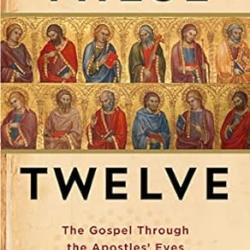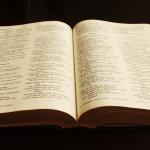One of the frustrations of writing one’s doctoral dissertation on the Eucharist is the voluminous literature on the subject. In the footnotes of every book one reads, one finds five more books one must read. This list cannot, therefore, be considered complete. There are far too many books on my to-read list for me to pretend to speak authoritatively. What follows, then, is more like a progress report. I have spent three years reading about the Eucharist and, so far, if I had to recommend five books to an interested reader, these are the five.
1. Summa Theologiae, St. Thomas Aquinas
Though reading Thomas is an odd experience for the unacquainted, the church has chosen to rely on him, on this question in particular, for good reason. It can be difficult to discern it while plowing through obscure quaestios, but Thomas’s work on the Eucharist is a masterful and balanced synthesis that heartily affirms the Church’s traditional understanding of Christ’s Eucharistic presence while skillfully avoiding many of the excesses of his time. It is a shame that he has been so widely employed to promote those very excesses in subsequent generations, often by people who haven’t read him.
2. Corpus Mysticum, Henri de Lubac
It is impossible to fully appreciate the work of Thomas Aquinas on the Eucharist if one does not understand the Eucharistic controversies in the Church in the centuries that preceded him. Cardinal de Lubac’s seminal study of the development of the Church’s Eucharistic understanding in the Middle Ages is the single most important work on this topic. De Lubac’s demonstration that, after Berengar, the Church’s need to tie the Eucharist more explicitly to Christ’s natural body severed the relationship between the Eucharist and Christ’s ecclesial body set the stage for the revival of Eucharistic ecclesiology in the 20th century.
3. The Risen Christ and the Eucharistic World, Gustave Martelet
Christ’s Eucharistic presence utterly depends upon the fact that the resurrection has made the incarnation available to (and through) the Church throughout history. The eschatological significance of the Eucharist shines through clearly in this unique book. That Christ is both Alpha and Omega, that he is both the Word through whom God made the universe and the final destination of all creation, means that the resurrection is the beginning of the incorporation of all created reality into his body. I know of no other work that so carefully and convincingly relates the Eucharist, the resurrection, and eschatology. It will change the way you think about all three.
4. Eucharist: Presence of Christ, F.X. Durrwell
In a brief 60 pages, Durrwell offers us a Eucharistic theology that is at once fresh and traditional. Writing shortly after the semi-failed experiments of transsignification and transfinalization, Durrwell produced a lucid work putting Eucharistic theology in its appropriate contexts, paschal and eschatological. In so doing, he gives us a rereading of the doctrine of transubstantiation that insists it be understood not as the transformation of one worldly object into another, but as the elevation of the worldly to the celestial—the in-breaking of the eschaton into history.
5. Eucharist, Robert Barron
This short work is more popular than scholarly. It is a shame that Barron does not include footnotes because this reader, at least, would love to know Barron’s sources. This book’s great strength is its ability to simplify without oversimplifying. Barron pulls together the major themes of Catholic Eucharistic theology in an insightful, biblically-informed synthesis. Eschewing the exclusive emphases of left and right, Barron insists upon the interdependence of the Eucharistic themes of meal and sacrifice, all anchored by a theology of Real Presence delightfully articulated with reference to Scripture, the classical theological tradition, and contemporary theology and philosophy. It is, quite simply, the best popular book on the subject.
Honorable Mentions: Both Herbert McCabe, O.P. and Joseph Ratzinger have written many penetrating things on the Eucharist, but most of these have occurred in occasional writings, not in full-length books devoted especially to the Eucharist. (Ratzinger’s God is Near Us is a collection of occasional writings/speeches all devoted to this topic.) Alexander Schmemann’s work Eucharist: Sacrament of the Kingdom is a brilliant work from an Orthodox perspective.
Have you read any of these authors or works? What struck you about them? What books would you add to my list?
Brett Salkeld is a doctoral student in theology at Regis College in Toronto. He is a father of two (so far) and husband of one.














